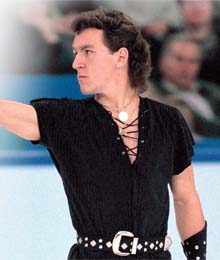Elvis Stojko: Ice King
December 5, 2012 by Madeline Stephenson
Filed under Celebrity
 Elvis Stojko is peering out of his office window, directing his gaze towards Mexico’s shimmering Lake Chapala. Surrounded by lush Sierra Madre mountains in the town of Ajijic, Jalisco, the Canadian-born ice icon has found his home in a hacienda-style estate that’s more than 5,000 feet above sea level. “You pretty much see the sun every single day,” he says over the phone, revelling in the dry heat he’s become acclimatized to over the last 11 years. In the cottage country community of 15,000, Stojko has found the warmth and seclusion he’s always craved. “Living life here is very relaxed in a way,” says the three-time world figure skating champion, who savours the anonymity his celebrity rarely sanctioned on the streets of Toronto. It’s been a decade since Stojko officially left the competitive realm, but as he reflects on his remarkable career and the personal and professional spin-offs it elicited, there’s a sense the word retire will never be in his lexicon.
Elvis Stojko is peering out of his office window, directing his gaze towards Mexico’s shimmering Lake Chapala. Surrounded by lush Sierra Madre mountains in the town of Ajijic, Jalisco, the Canadian-born ice icon has found his home in a hacienda-style estate that’s more than 5,000 feet above sea level. “You pretty much see the sun every single day,” he says over the phone, revelling in the dry heat he’s become acclimatized to over the last 11 years. In the cottage country community of 15,000, Stojko has found the warmth and seclusion he’s always craved. “Living life here is very relaxed in a way,” says the three-time world figure skating champion, who savours the anonymity his celebrity rarely sanctioned on the streets of Toronto. It’s been a decade since Stojko officially left the competitive realm, but as he reflects on his remarkable career and the personal and professional spin-offs it elicited, there’s a sense the word retire will never be in his lexicon.
The 40-year-old, whose blades first sliced the ice when he was four, captured Canadian audiences with his unconventional charisma and outspoken opinions, yet he can’t aim a dart at just one bull’s-eye benchmark that stands out as his most memorable. “Oh my gosh,” he says, sweeping the corners of his mind to find the right feat. “Making the world team back in 1990 was huge because I was only 17 and I came out of nowhere,” he begins, segueing to the clean program he delivered at the Canadian championships that same year: “I’ll always remember that skate in Sudbury.” One stride at a time, he started seizing world titles and Olympic medals, breaking records in-between by landing the first-ever competition quad-double and quad-triple combinations in ’91 and ’97. “It was crazy, it was just so intense and I just put it all on the line,” he says of the latter accolade, which he nailed at the sold-out Grand Prix finals in Hamilton. “I could have just went for the win because I was first after the short program, but I said, ‘no, let’s do this, let’s risk it all.’”
Read more






